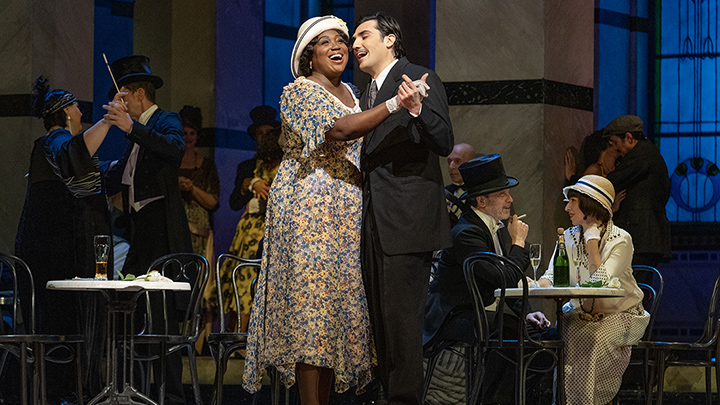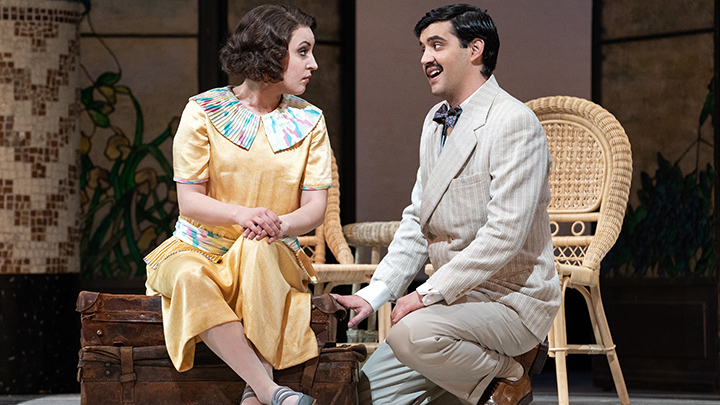
In these hundred years since the composer’s death, La rondine has received any number of either affectionate or disapproving superlatives. But “most literary” surely deserves to be one of them, as well.
Rondine spurts late from the Decadent vein that gained steam in Europe at the end of the 19th century – its libretto, a more than serviceable text by Giuseppe Adami — is simultaneously a parody of that era (with the pretentious aesthete and poet Prunier as a stand-in for Gabriele D’Annunzio) yet derives its structure from the idiom at which it pokes fun (the libretto is peppered with D’Annunzio easter eggs — from the images of cascading flowers to the “santo amor” of the “eletta” Magda). There is practically all of Rondine and much, much more (including a very kinky scene with tea referenced at the beginning of Act III) if you read his Piacere.
But D’Annunzio was ultimately a Wagnerian and the operetta aspirations of Rondine express themselves in a ceaselessly recycled parade of whistleable, dancey melodies which resurface at key moments. If the opera mocks the nostalgia for a decidedly anti-nostalgia aesthetic moment, its effect is at least in part dependent on our own ability to reminisce within the opera itself. Its dramaturgical logic is always doubling back on itself and sentimental love is the germ invading Paris and invading the score itself. Puccini, you sly bastard! You’ve been in on it the whole time.
So, what’s a wistful girl like Magda, the flighty swallow of the opera’s title, to do, stuck in the center of it as she is? Angel Blue, debuting the role of a kept woman who steps out for love, only to be lured back to the big city by a combination of guilt and financial necessity (sound familiar?), about met my expectations; it’s a thick, rich sound, quite secure if somewhat lacking in dynamic nuance (or any float) across the range, but there’s not a sarcastic, much less “perversa,” bone in her body. Instead she’s all earnestness and creamy vocalism, a decidedly Lutheran Magda whose second Act I aria, in which she ironically tries to impart a lesson on love the she herself is yet to truly learn, looked more like Minnie’s Bible scene than any sort of sexed-up school for lovers.
But there is a warmth to her naivete that almost redeems what was inevitably a temperamental mismatch (Rondine die-hards would be wise to catch Ailyn Pérez as an ideal Magda in DC in about 10 days). Starting from the Doretta aria, which began a little one-note (loud) and grew to a dreamy climax despite the alacrity with which conductor Speranza Scappucci goaded it along, she progressively draws a melancholy veil over her sound as the opera goes on and in Act III, the steady fever of Scappucci’s orchestra pit spiked frequently with some unexpected moments of chesty drama from her prima donna. If the wanness of her final “ah,” right after she decides to leave a devastated Ruggero, about summed up the forthright blankness of her take on the part, the whole thing proved nevertheless a worthwhile experiment, more than competent and sumptuously sung.
More satisfying, though, and more hotly anticipated, was the house debut of Jonathan Tetelman as Ruggero. Much as the character seems transplanted from another era of opera, Tetelman was a striking import from his very first aria (“Parigi, città dei desideri”), sung with such lightness of attack but long, gentle phrases. The carriage of the voice is unimpeachable and despite a lithe, patinaed timbre (which melded nicely with Blue’s plusher sound), he nevertheless has squillo and fortissimo high notes in reserve. But beyond that, he’s exceptionally appealing onstage. Unpretentious, an agile actor, and his long-legged handsomeness has a puppydog quality that afforded a marked ratcheting up to the heat of Magda and Ruggero’s hobbled Act III bliss. We’ll see how this persona fares for the less sympathetic Pinkerton next month, but his vocal stylishness and refreshingly gallant bearing were a winning combination in the strongest of the evening’s three very polished debuts.
Emily Pogorelc, as Magda’s mouthy maid Lisette, saturated the part with spark and bite. She rides her light lyric instrument hard and the lower writing for Act III brushes the upper limits of audibility, but the darker undertones at the center of her range have a delicious complexity to them and she’s an apt comedienne. Bekhzod Davronov completed the lead quartet as a boyish Prunier with a tawny evenness of tone that complemented both Pogorelc and Tetelman. In Act II’s quartet, Scappucci brought them gradually to climax with a quicksilver nimbleness that overflowed with detail yet narrowly escaped turning lumbering. In fact, the same could be said for her conducting all evening; from spiky dissonances in the overture to a refreshing azure transparency in the cloying technicolor pages that open Act III, Scappucci can be relied on to reliably (and rarely, amongst her colleagues) bring a point-of-view to the Puccini scores she conducts. The covering of the singers that marked the first half of Act I (including the sharpened, menacing brusqueness of Alfred Walker as Magda’s keeper, Rambaldo), which I imagine will improve throughout the run, can be forgiven.
Nicolas Joel’s 1920s production is straightforward in its storytelling, but its handsome sets by Ezio Frigerio are too open and airy for a story that is fundamentally about feelings of suffocation. The tortured saga of Franca Squarciapino’s mostly elegant costumes for this production continues here (Angela Gheorghiu, who originated the production, originally insisted on her own flapperware), and I’ll only say that Angel Blue’s costumes are more flattering than the publicity photos would have you believe.
This high-quality revival proved a welcome return for Puccini’s little bird to its oversized, gilded Metropolitan nest and the curtain calls were some of the most genuinely emotional I’ve seen in recent memory. If the opera’s recherché cynicism and retrograde cultural commentary have blocked it from the standard repertoire, its strength and sweetness contributed to a happy reception on Tuesday. It was a promising start to New York’s Decadent operatic spring which includes the upcoming house debut of Asmik Grigorian as Butterfly and the domestic premiere of Nadia Boulanger’s only opera, La Ville Morte (itself based on a play by D’Annunzio), by Catapult Opera in April.
Photos: Karen Almond/MetOpera



























Comments